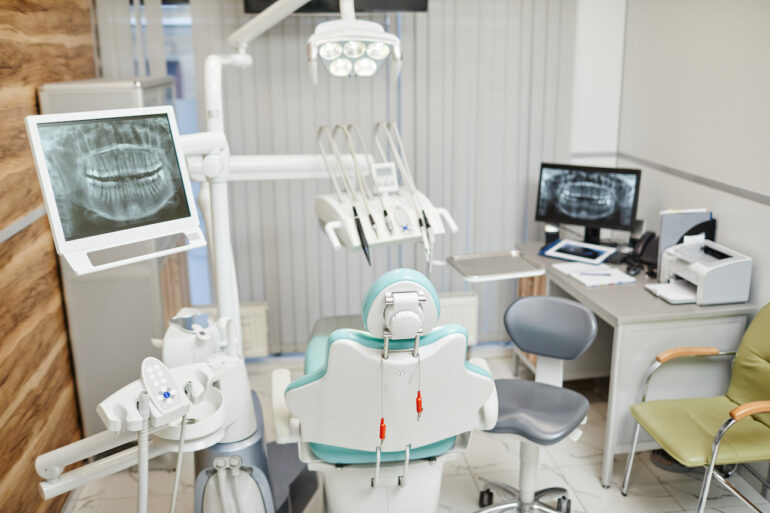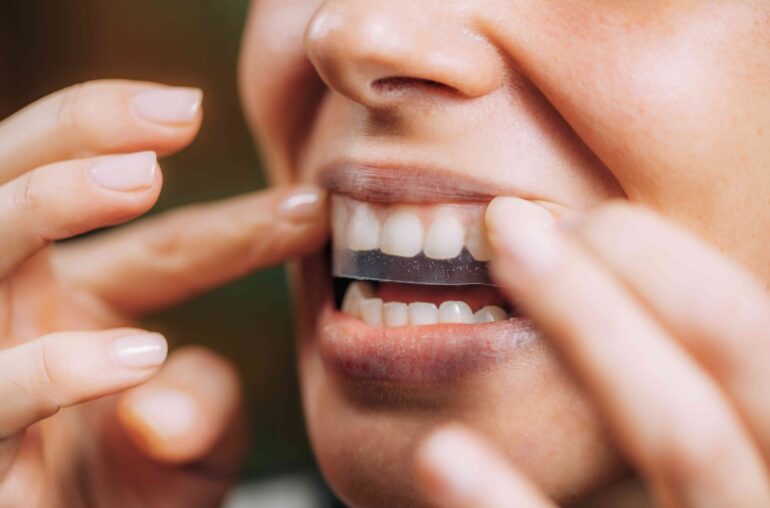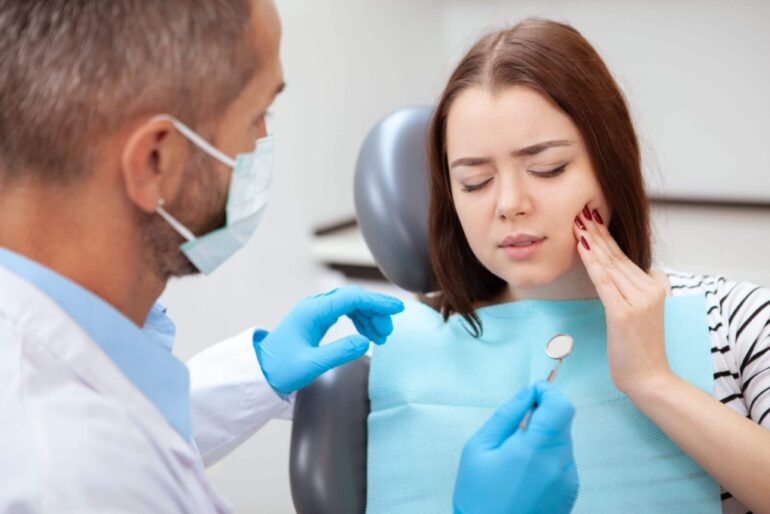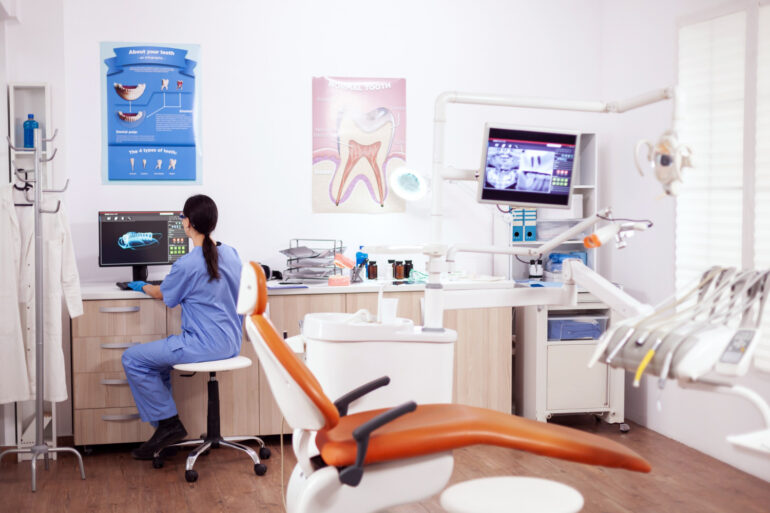
Key Takeaways:
- Oral health is linked to overall health, with poor dental hygiene contributing to various other health conditions such as heart disease, diabetes, and respiratory infections.
- Tooth decay, gum disease, dental injuries, and oral cancer are common dental security risks.
- Proper dental security impacts the quality of life by preventing dental issues, boosting self-esteem, and improving overall happiness.
- Choosing a trustworthy dentist, regular check-ups and proper oral hygiene are important for dental security.
- The right toothbrush, regular dental cleanings, and a healthy diet are crucial for dental security at home.
- Teeth-whitening methods include professional treatments, at-home whitening kits, and natural remedies.
- Proper flossing techniques and maintenance of healthy gums are vital for dental security.
- In case of dental emergencies, immediate care is necessary for sudden tooth pain, chipped or broken teeth, and signs of urgent dental issues.
1. Understanding the Importance of Dental Security

When it comes to our overall health, we often prioritize maintaining a balanced diet and regular exercise. However, one aspect that is sometimes overlooked is dental security. Ensuring the health and safety of our teeth and gums is crucial not only for maintaining a beautiful smile but also for our overall well-being.
Why Dental Security Matters for Your Overall Health
Did you know that oral health has been linked to various other health conditions? Research has shown that poor dental hygiene can contribute to heart disease, diabetes, respiratory infections, and even pregnancy complications. This is because the mouth harbors millions of bacteria, and when oral hygiene is neglected, these bacteria can enter the bloodstream, causing inflammation and increasing the risk of developing these conditions.
Moreover, gum disease has been linked to an increased risk of strokes and Alzheimer’s disease. This makes dental security an essential part of our overall health management.
Common Dental Security Risks You Should Be Aware Of
There are several common dental security risks that individuals should be aware of in order to take necessary preventive measures. A common risk to oral health is tooth decay, which occurs due to the buildup of plaque—a sticky layer of bacteria on the teeth. Without treatment, tooth decay can result in cavities and potentially lead to tooth loss.
Gum disease is another significant risk. It starts with the inflammation of the gums caused by the buildup of plaque. If not addressed promptly, it can progress to periodontitis, a more severe form of gum disease that damages the bone supporting the teeth.
Other dental security risks include dental injuries resulting from accidents or sports activities, as well as oral cancer, which can be life-threatening if not detected and treated early.
How Dental Security Impacts Your Quality of Life
Your dental security directly impacts your quality of life in several ways. For starters, if you have persistent dental issues such as toothaches, gum infections, or missing teeth, it can significantly affect your ability to eat, speak, and smile confidently. Dental pain can be debilitating and impact your overall well-being and daily activities.
Furthermore, studies have shown that dental insecurity can lead to decreased self-esteem and social anxiety. It can make individuals hesitant to participate in social situations, affecting their personal and professional relationships. On the other hand, having a healthy and attractive smile boosts self-confidence, leading to improved mental health and overall happiness.
2. Safeguarding Your Smile ─ Best Practices for Dental Security

Choosing a Trustworthy Dentist ─ What to Look for
When it comes to safeguarding your smile, choosing a trustworthy dentist is paramount. A good dentist will not only provide excellent dental care but will also prioritize your comfort and safety during procedures. To ensure you find a reliable dentist, consider the following factors:
- Qualifications and experience ─ Check the dentist’s qualifications and certifications to ensure they have the necessary expertise. Additionally, consider their experience in the field and any specialized training they may have.
- Patient reviews ─ Read patient reviews and testimonials to get an understanding of other people’s experiences with the dentist. Positive reviews can provide peace of mind and indicate a dentist’s reputation.
- Range of services ─ Look for a dentist who offers a comprehensive range of services, from routine cleanings and check-ups to cosmetic dentistry and oral surgeries. This ensures that all your dental needs can be addressed under one roof.
Importance of Regular Dental Check-ups and Cleanings
Regular dental check-ups and cleanings are essential for maintaining dental security. These visits allow your dentist to monitor your oral health, identify any issues at an early stage, and provide necessary treatments or interventions.
During a dental check-up, your dentist will examine your teeth, gums, and mouth for any signs of decay, gum disease, or other oral health problems. They may also take X-rays to detect hidden issues, such as cavities between teeth or problems with the jawbone.
Professional dental cleanings, typically performed by dental hygienists, remove plaque and tartar that cannot be removed by regular brushing and flossing alone. This helps in preventing tooth decay and gum disease, ensuring optimal dental security.
Having a secure dental plan significantly reduces out-of-pocket expenses for regular dental check-ups and cleanings. These routine visits are often fully or partially covered under most dental insurance plans, ensuring that you can maintain optimal oral health without financial strain. Regular check-ups and cleanings help prevent more serious dental issues, which can be costly if left untreated. Therefore, a good dental plan not only promotes consistent oral care but also provides financial peace of mind.
Protecting Your Teeth: Tips for Proper Oral Hygiene
Proper oral hygiene is fundamental for protecting your teeth and maintaining dental security. Here are some essential tips:
- Brushing technique ─ Use a soft-bristle toothbrush and fluoridated toothpaste to brush your teeth at least twice a day. Angle the bristles towards the gum line and brush in gentle circular motions for two minutes. Don’t forget to brush your tongue to remove bacteria and freshen your breath.
- Flossing ─ Floss daily to remove food particles and plaque from between your teeth and along the gum line.
- Mouthwash ─ Add an antimicrobial mouthwash to your daily regimen to eliminate bacteria and keep your breath fresh. Rinse for 30 seconds after completing your brushing and flossing routine.
- Healthy diet ─ Reduce the intake of sugary and acidic foods and drinks, as they can lead to tooth decay. Instead, choose a balanced diet that includes plenty of fruits, vegetables, lean proteins, and dairy products to maintain strong teeth and healthy gums.
3. Dental Security at Home ─ Steps to Ensure Optimal Protection

The Ultimate Toothbrush Guide ─ Choosing the Right One for Your Needs
Choosing the right toothbrush is crucial for maintaining optimal dental security at home. Here are some factors to consider when selecting a toothbrush:
- Bristle type ─ Toothbrushes come with soft, medium, or hard bristles. It is recommended to opt for a toothbrush with soft bristles, as hard bristles can damage the gums and tooth enamel over time.
- Size and shape ─ Choose a toothbrush with a size and shape that comfortably fits in your mouth, reaching all areas easily. A toothbrush with a small head is generally preferable, as it can access hard-to-reach areas.
- Electric vs. manual ─ While both electric and manual toothbrushes can be effective, electric toothbrushes have been found to provide better plaque removal and improve overall oral hygiene.
Exploring Effective Teeth-Whitening Methods
Having a bright, white smile is often associated with health and beauty. If you’re looking to achieve a whiter smile, there are various effective teeth-whitening methods available.
- Professional teeth whitening ─ Professional teeth whitening treatments performed by dentists use stronger bleaching agents and provide faster and more noticeable results compared to over-the-counter products. This method ensures safe and controlled whitening.
- At-home whitening kits ─ Over-the-counter whitening kits come with whitening gels or strips that can be applied at home. While they may provide visible results, they are generally slower and less potent than professional treatments.
- Natural whitening remedies ─ Some natural remedies, such as baking soda, hydrogen peroxide, or activated charcoal, are believed to have whitening properties. However, it’s essential to exercise caution and consult with a dentist before attempting these remedies, as they may have potential risks or limited effectiveness.
Maintaining Healthy Gums ─ Techniques for Proper Flossing
Proper flossing is essential for maintaining healthy gums, preventing gum disease, and ensuring dental security. Follow these techniques for effective flossing:
- Break off a piece ─ Start by breaking off a piece of floss about 18 inches long. Wind most of it around one of your middle fingers and the remaining floss around the same finger on the opposite hand.
- Slide between teeth ─ Firmly grasp the floss between your thumbs and forefingers. Carefully slide the floss between your teeth using a gentle sawing motion. Avoid snapping the floss to prevent gum injury.
- Curve around the tooth ─ When the floss touches the gum line, shape it into a C around the base of the tooth. Carefully slide the floss up and down, making sure it goes below the gum line to remove plaque and debris.
4. Navigating Dental Emergencies ─ What to Do in Critical Situations

Sudden Tooth Pain ─ How to Identify and Relieve It
Sudden tooth pain can be caused by various factors, including tooth decay, gum disease, dental injuries, or dental abscesses. If you experience sudden tooth pain, follow these steps:
- Rinse your mouth ─ Rinse your mouth with warm saltwater to help alleviate any swelling and provide temporary relief.
- Use cold compresses ─ Apply a cold compress to the affected area to reduce pain and swelling. Wrap ice in a clean cloth and hold it against your face, near the painful tooth.
- Take over-the-counter pain relievers ─ Take over-the-counter pain relievers like ibuprofen to help reduce pain, but avoid placing aspirin directly on the tooth, as this can cause further tissue damage.
Handling Chipped or Broken Teeth: Quick Fixes and Long-Term Solutions
If you chip or break a tooth, it’s essential to take immediate action to prevent further damage and seek dental care. Here’s what you can do:
- Save the pieces ─ If feasible, gather any fragments of the broken tooth and rinse them with warm water. Store them in a sterile container with milk or your saliva to maintain moisture, potentially assisting in reattachment.
- Rinse your mouth ─ Rinse your mouth with warm water to remove any sharp fragments or blood.
- Apply pressure ─ If there is bleeding, apply gentle pressure with a clean gauze or cloth to stop it. You can also use a cold compress on the outside of the mouth to reduce swelling.
Remember to visit your dentist as soon as possible for appropriate treatment and to discuss long-term solutions such as dental bonding, veneers, or dental crowns.
When to Seek Immediate Dental Care: Signs of Urgent Dental Issues
While prevention is key to maintaining dental security, dental emergencies can still occur. It is crucial to know when to seek immediate dental care. Contacting an Akutt Tannlege can ensure you receive fast, professional treatment before the condition worsens.
Some signs of urgent dental issues include:
- Severe toothache ─ If you encounter intense and ongoing tooth pain, it could signal an infection or dental abscess, necessitating urgent dental care.
- Knocked-out tooth ─ If a tooth is knocked out due to an accident or injury, it’s important to see a dentist immediately. In some cases, the tooth can be saved if promptly reinserted.
- Loose or displaced tooth ─ If a tooth becomes loose or significantly displaced, it could be a sign of dental trauma or injury. Seeking immediate dental care is crucial to increase the chances of saving the tooth.
- Excessive bleeding ─ If you experience uncontrolled bleeding from the mouth, it may be an indication of a severe dental issue or trauma. Immediate dental care is necessary to address the underlying cause and stop the bleeding.
If you encounter any of these situations, it’s essential to contact your dentist or visit an emergency dental clinic promptly for appropriate diagnosis and treatment.
In conclusion, dental security plays a significant role in our overall health and well-being. By understanding its importance, practicing proper oral hygiene, and promptly addressing any dental issues or emergencies, we can maintain a healthy and confident smile for a lifetime.
Remember to choose a trustworthy dentist, schedule regular check-ups, and seek immediate dental care when necessary. By following these best practices and guidelines, you can ensure optimal dental security and enjoy the benefits of a healthy smile.
FAQ

What are the common risks to dental security?
Tooth decay, gum disease, dental injuries, and oral cancer are common dental security risks.
How does dental security impact quality of life?
Dental security impacts the quality of life by preventing dental issues, boosting self-esteem, and improving overall happiness.
What should I look for when choosing a dentist?
When choosing a dentist, consider their qualifications and experience, patient reviews, and the range of services they offer.
Why are regular dental check-ups and cleanings important?
Regular dental check-ups and cleanings allow dentists to monitor oral health, identify issues early, and provide necessary treatments.
What tips can help maintain proper oral hygiene at home?
Tips for proper oral hygiene include using a soft-bristle toothbrush, flossing daily, using an antimicrobial mouthwash, and maintaining a healthy diet.
How can I choose the right toothbrush?
Factors to consider when choosing a toothbrush include bristle type, size and shape, and whether to use an electric or manual toothbrush.
What are effective methods for teeth whitening?
Effective teeth whitening methods include professional treatments, at-home whitening kits, and natural remedies.
How can I properly floss to maintain healthy gums?
To properly floss, break off a piece of floss, slide it between teeth in a sawing motion, curve it around each tooth, and slide it below the gum line.
Useful resources:
- MouthHealthy – Oral health information and resources from the American Dental Association
- WebMD Oral Health – Articles and guides on oral health and dental care
- Oral-B – Information on oral care products and dental hygiene tips
- Colgate Oral Health Center – Educational articles and resources on oral health
- CDC Oral Health – Oral health resources from the Centers for Disease Control and Prevention
- American Dental Association – Professional association with resources on dental health and care
- National Institute of Dental and Craniofacial Research – Research and information on dental and craniofacial health
- British Dental Association – Advice and information on dental health from the UK
